
Nutrients - found in all sorts of foods, are one of the keys to good mental health
Food – it’s all around us and very few people in a country such as the UK would think about going without a regular top-up of scoff each day – in fact many times a day. And yet, this incredibly important aspect of our lives has become a victim of modern consumerism to the extent that we typically no longer actually think about what we are putting inside us as long as it comes out of a packet, looks good and, frequently, satisfies a momentary need to fill a grumbling tummy. Increasingly, it also has to satisfy cravings for “strong tastes”, which usually means it is laced with too much salt or sugar, to say nothing of artificial flavours.
People who leave the Services can sometimes find the task of selecting and cooking food somewhat daunting. In the Forces you are generally fed in a cookhouse or galley, or you live off rations which, to be honest, do not involve “cooking” as such, merely heating. Of course this does not apply to those who might have subsisted on smoked snake or wild-pig – but there are not too many of those available in your average corner-shop.
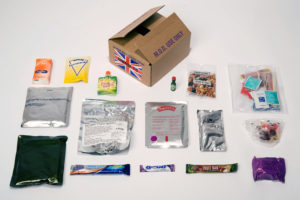
A change in circumstances, such as those caused by leaving the Forces, together with any other specific issues such as PTSD or physical injuries, can lead to problems such as depression. If at the same time, your diet changes for the worse and you find yourself unable to take proper exercise, this can have quite serious effects upon your mental and physical well-being that you might not be aware of. What might make it worse is the fact that, as you are affected by a deterioration in diet, you might lose your awareness of the need to eat well; you can enter a bit of a spiral from which it can be hard to escape unless you have someone to help you see what is going on.
We generally all know that decent food is good for the body – but it’s also good for the brain. Good food supports the protein-building blocks, enzymes, brain tissue, and neurotransmitters that transfer information and signals between various parts of the brain and body. Certain nutrients and dietary patterns can lead to changes in a protein that helps increase connections between brain cells.
In fact, a new concept has arisen out of the profound realization that food really can make us different; it’s called “Nutritional (or Food) Psychiatry”. Up to a few years ago, research into the effects of food had been somewhat shallow. By about 2010, it was being suggested that supplements such as Omega 3 could help balance mood, but it was not until after that that people really became aware that there is a worldwide link between the nature and quality of diet and many of the most common mental disorders.
Some now argue that doctors should be more prepared to advise us what we should be eating, rather than what we should avoid. Nutritional advisers take this one step further, believing that a food-assessment should be a standard part of any psychiatric evaluation. According to one psychiatrist, diet might be one of the most effective ways we currently have of affecting moods and brain patterns:
“By helping people shape their diets, we can improve their mental health and decrease their risk of psychiatric disorders. No matter where you are on the spectrum of mental health, food is an essential part of your treatment plan. If you are on medications, they are going to work better if you are eating a brain-healthy diet of nutrient-dense foods.”
So what should you avoid and what are “good brain foods”?
You should try to limit sugary and high-fat, processed foods. Go for fresh fruits, vegetables and whole grain choices of cereals. Swap butter for healthier fats like olive oil. This is what is called a “Mediterranean diet” which is quite different to the standard UK diet, and, to be honest, is not always that easy to achieve given the range of foods on offer in some British shops.
It is a rather sad fact of life that the traditional British diet is full of things that are now regarded by some as being positively bad for you and your brain. Starchy foods, full-fat frying, a traditional dinner of meat and two (heavily-boiled) veg etc. It is not very good news, though, to be fair, even this is a lot better than grazing from packets of crisps and biscuits.
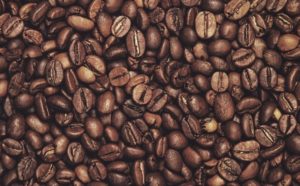
Avoid Caffeine if you can: it is a stimulant, which means it will give you a quick burst of energy, but then may make you feel anxious and depressed, disturb your sleep (especially if you have it before bed), or give you withdrawal symptoms if you stop suddenly. Caffeine is in tea, coffee, chocolate, cola and other manufactured energy drinks. If you drink tea, coffee or cola, try switching to decaffeinated versions. You might feel noticeably better quite quickly if you drink less caffeine or avoid it altogether.
(Bear in mind that there is no simple answer to whether coffee is 100% bad for you. Adverts talk about “roasting” which is polite way of saying “burnt”. Rather like burnt toast, which you should not eat, this produces a whole range of compounds which are not at all kind to the human body and some of which are associated with cancers. You will be taking these in whether you drink ordinary or decaffeinated coffee. On the other hand, some say coffee can help with certain brain functions and could even make you live longer!)
Choose foods that are packed with nutrients as there are strong indications that they can help in the treatment or prevention of mental illness. The European Food Safety Authority has looked at the scientific evidence that supports health claims and approved claims for some nutrients in relation to psychological and cognitive functions. Deficiency in such nutrients can affect mood. Particularly important are B vitamins including thiamine, niacin and folate, and the minerals iron and zinc.
Vitamin B. People with low B12 levels have more brain inflammation and higher rates of depression and dementia. A deficiency has long been linked to low moods. It can be found in fortified breakfast cereals, enriched milk, fish, poultry, meat and eggs. It is usually not a problem – but sometimes the body cannot take in the necessary amounts.
Iron. Iron-deficiency (also called anaemia) can produce a general lack of energy – but has also been linked to depression. Good sources include red meats, shellfish, spinach (low in calories), pumpkin seeds, legumes (such as alfalfa, clover, peas, beans, chickpeas, lentils, lupin bean, mesquite, carob, soybeans, peanuts and tamarind), and “Organ Meat” such as liver etc.
Zinc. This nutrient helps control the body’s response to stress. Low levels can cause depression. If you have a significant deficiency, then animal foods are regarded as better sources of zinc than plant foods. Meat is a good source, as are shellfish (which can have very low levels of calories as well). As with iron, many breakfast cereals are fortified with zinc. Seeds and nuts are good, as well as dairy and eggs.
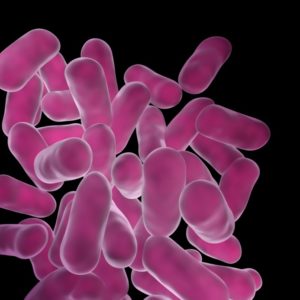
It’s worthwhile considering “fermented foods” as a separate category. These involve fermenting edible foods in a variety of processes to produce things such as yoghurt, sauerkraut (which is NOT the same thing as pickled cabbage), kefir and kimchi. The resulting probiotics comprise a large number of different strains of “good” bacteria and other microorganisms, such as yeasts. When taken in adequate amounts, these live microorganisms can have measurable biological effects in the body and may confer health benefits. Probiotics have been consumed for thousands of years, and are now widely available for consumers in various forms, including capsules and dairy products such as live yoghurt and yoghurt drinks. These good bacteria assist the body in many ways but, specifically, help absorb the nutrients listed above, making them more available to the brain. This can in turn help reduce anxiety, stress, and depression.
The question of “Fats”. A high-fat or high-sugar diet is bad for gut health and, therefore, your brain. However, your brain needs fatty acids (such as omega-3 and -6) to keep it working well. So rather than avoiding all fats, it’s important to eat the right ones. Healthy fats are found in: oily fish, poultry, nuts (especially walnuts and almonds), olive and sunflower oils, seeds (such as sunflower and pumpkin), avocados, milk, yoghurt, cheese and eggs. Try to avoid anything which lists ‘trans fats’ or ‘partially hydrogenated oils’ in the list of ingredients (such as some shop-bought cakes and biscuits). They can be tempting when you’re feeling low, but this kind of fat isn’t good for your mood or your physical health in the long run. Some research hints that a high-sugar diet worsens schizophrenia symptoms.
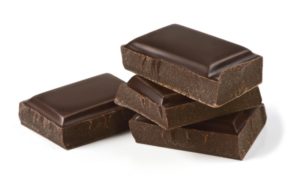
Dark chocolate often features on lists of healthy food, but make sure it is at least 70% cocoa as this is what gives it Flavanols, anti-oxidants which some studies indicate can help increase blood flow to the brain, aiding mood and memory (otherwise called cognitive function). However, chocolate contains caffeine (as mentioned above), and is loaded with fats and calories – so don’t overdo it! A daily maximum of two ounces is advisable.
(Please see the bottom of the article for a few things to be aware of that might be harmful when eaten in combination with certain sorts of medication.)
Does your “Five-a-Day” play any part in this?
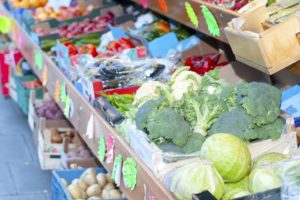
Yes – very much so. The Five-a-Day campaign is intended not just to keep you “regular” but to help your body and mind stay healthy. Vegetables and fruit contain a lot of the minerals, vitamins and fibre we need to keep us physically and mentally healthy, and eating a variety of different coloured fruits and vegetables every day means you’ll get a good range of nutrients.
Fresh, frozen, tinned, dried and juiced (one glass) fruits and vegetables all count towards your Five-a-Day a day. As a general rule, one portion is about a handful, small bowl or a small glass. For ideas on how to get your 5 a day, visit NHS Choices. www.nhs.uk/live-well/eat-well/why-5-a-day/
Affordability
This all sounds good – but how easy is it to get this sort of nutrition if you are facing other problems and money is tight? In many cases you do not have to eat the actual original foodstuff; for example, Omega oils can be taken as capsules; anti-oxidants can be bought as supplements as well. This might well reduce the cost as well as to make it possible to achieve a regular intake of these nutrients. However, if you are using these sorts of packaged supplements then it is still important to try to eat a healthy “Five-a-Day” diet as foods are not just about nutrients as has been explained already.
TMT will reproduce a British Nutrition Foundation article on affordable, healthy food. However, the main points may be summarised as follows:
- Plan your meals, make a grocery list and shop wisely – avoid impulse buying.
- Look for special offers on long shelf-life products like dried pasta, rice and noodles etc.
- Buy cheaper cuts of meat such as chicken thighs or drumsticks instead of chicken breast.
- Canned oily fish such as sardines and salmon can be cheaper than buying fresh fish.
- Check the frozen and canned fruit and vegetable section for cheaper items.
- Fresh fruit and vegetables can be cheaper if you buy them from the local market.
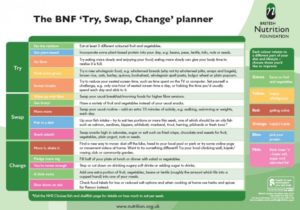
Try downloading this food planner from the British Nutrition Foundation
https://www.nutrition.org.uk/attachments/article/1150/BNF%20Try%20Swap%20Change%20Planner_WEB.pdf
Reasons to be careful:
If you’re taking an MAOI (a kind of antidepressant) you should avoid eating anything which has been fermented, spoiled pickled, smoked, cured, hung, dried or matured. This is because when food is exposed to the air, a substance called tyramine rises to high levels, and the interaction between tyramine and the MAOI can be very dangerous. You may also want to avoid foods and drinks containing caffeine such as chocolate, tea and coffee as these can also contain tyramine.
If you’re taking lithium, you will need to be very careful about the amount of salty foods and liquid in your diet. This is because suddenly changing the amount of salt and fluid in your body can affect your lithium level, and if your lithium level becomes too high it can be very dangerous.
If you’re taking an anti-anxiety medication such as buspirone, a type of medicine called an anxiolytic, you may need to avoid drinking grapefruit juice or eating grapefruit. This is because grapefruit can affect the way that enzymes break down medications, which can cause too much or too little of the drug to be absorbed into your blood.
If you are being treated for other illnesses it might be that a different set of food-priorities will kick-in. For example, cancer patients might well benefit from eating butter as it is a good source of energy and contains fat-soluble vitamins helpful the treatment of this disease.
If you are currently taking medication and are unsure or worried about what foods and drinks to eat or avoid, it might help to speak to your GP.
It should also be remembered that a deficiency resulting in a “low-mood” does not equate to the opposite, (that eating larger quantities of the important nutrients will promote a “better” mood), so high doses of supplements might not be advisable. Intakes at recommended levels are a much safer option for long-term use.
And finally….
If, as a result of reading this article, you decide to make significant changes to your diet, it is always advisable to talk to a GP or other health, or nutrition professional to make sure that your plans make good sense. Regardless, it is usually a good idea to introduce those changes over a period of time rather than hit the system with a deluge of new foods and supplements: we can probably all tell stories about the effects of going from rations back to fresh food after the end of a prolonged exercise or deployment!

Acknowledgements:
TMT is grateful to a number of charitable and government organisations and other websites for the information contained in this article. These include MIND, the British Nutrition Foundation, the NHS, the Royal Marsden NHS Foundation trust.
Images:
All images courtesy of the British Nutrition Foundation except for market veggies: NHS Crown copyright. and Rations: MOD Crown Copyright
Article to follow in a few days: “How to eat better for less”.

Comments on Food for thought - and mental well-being
There is 1 comment on Food for thought - and mental well-being
Comment from Sports drinks: What are you really putting in your body? • The Military Times